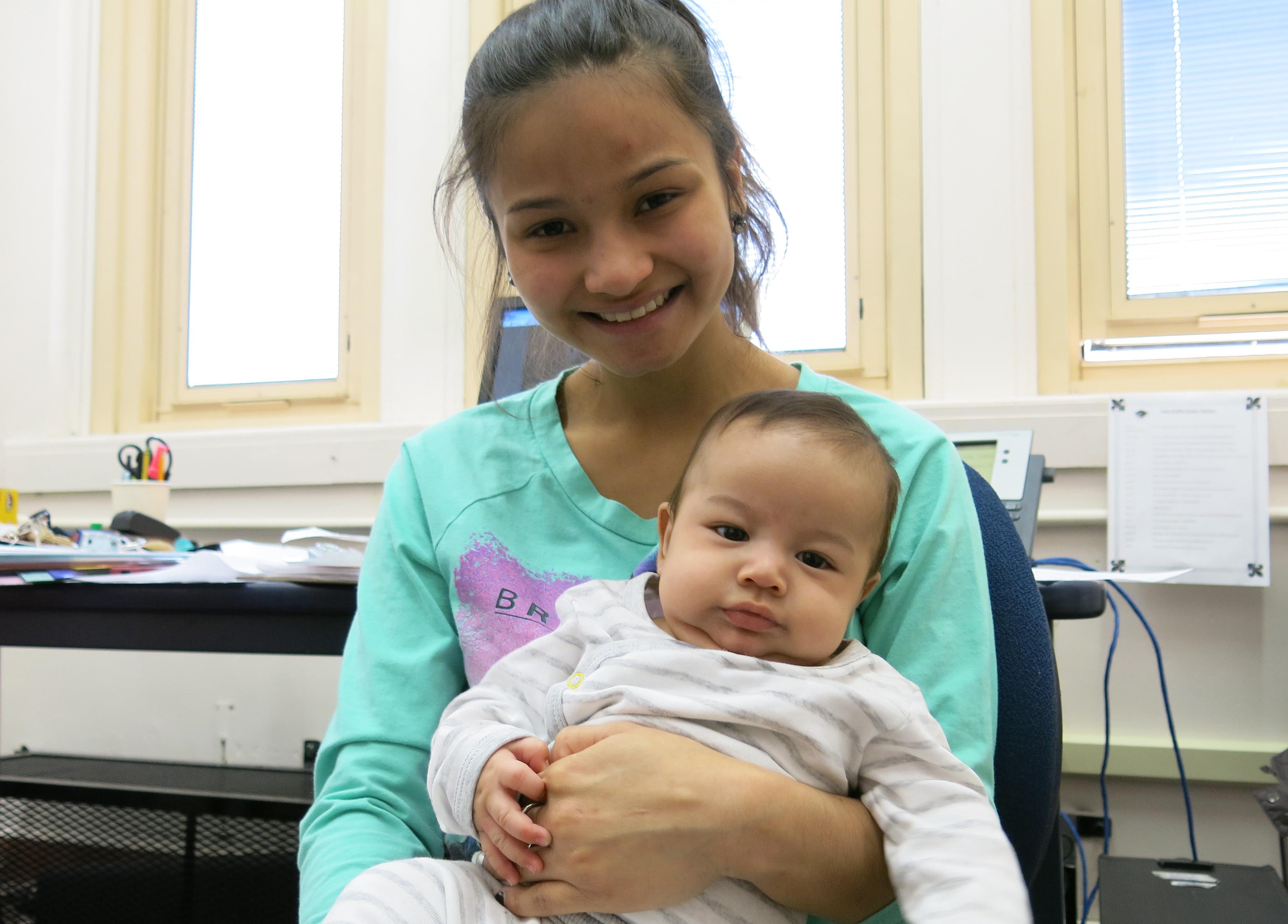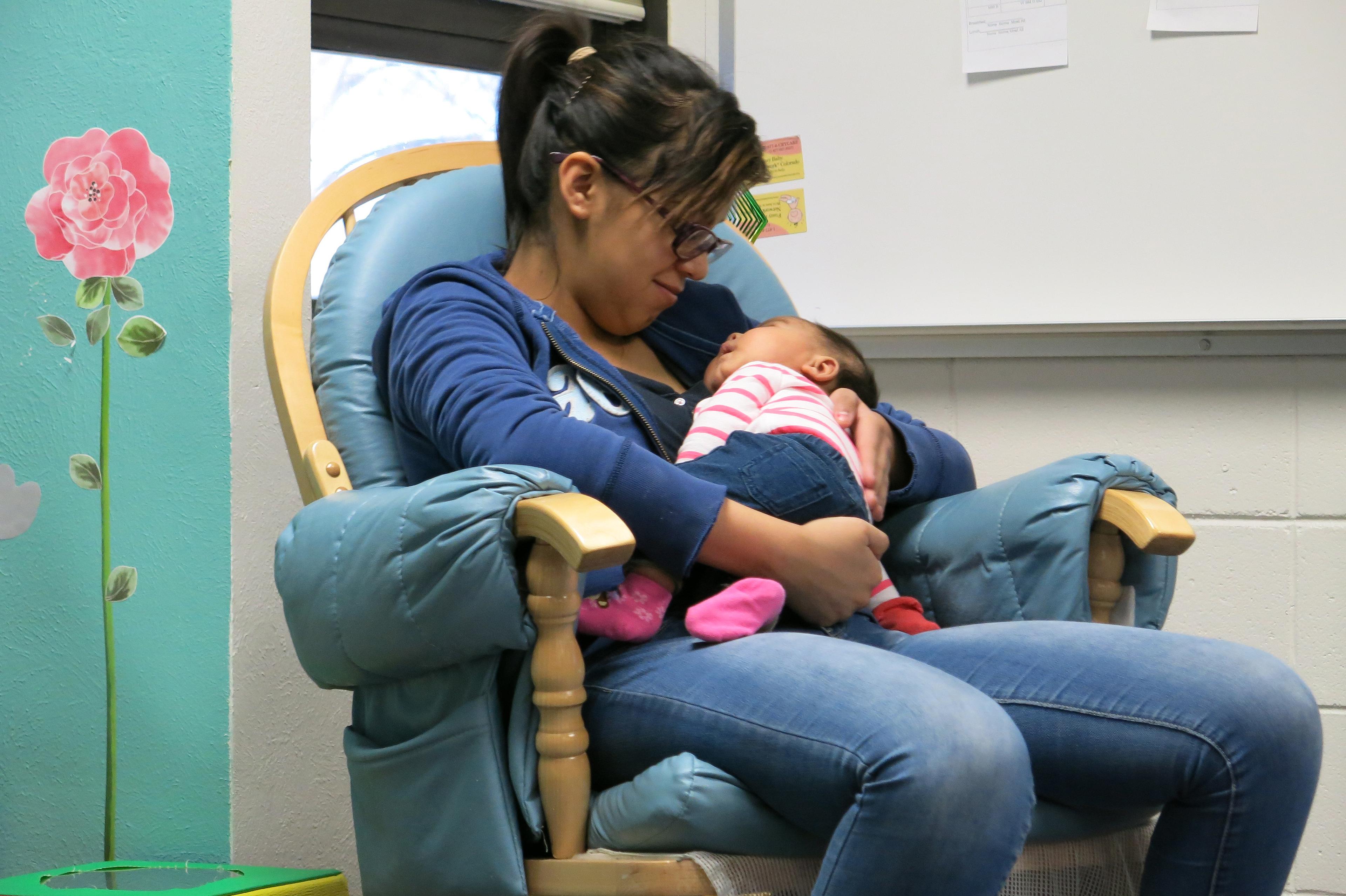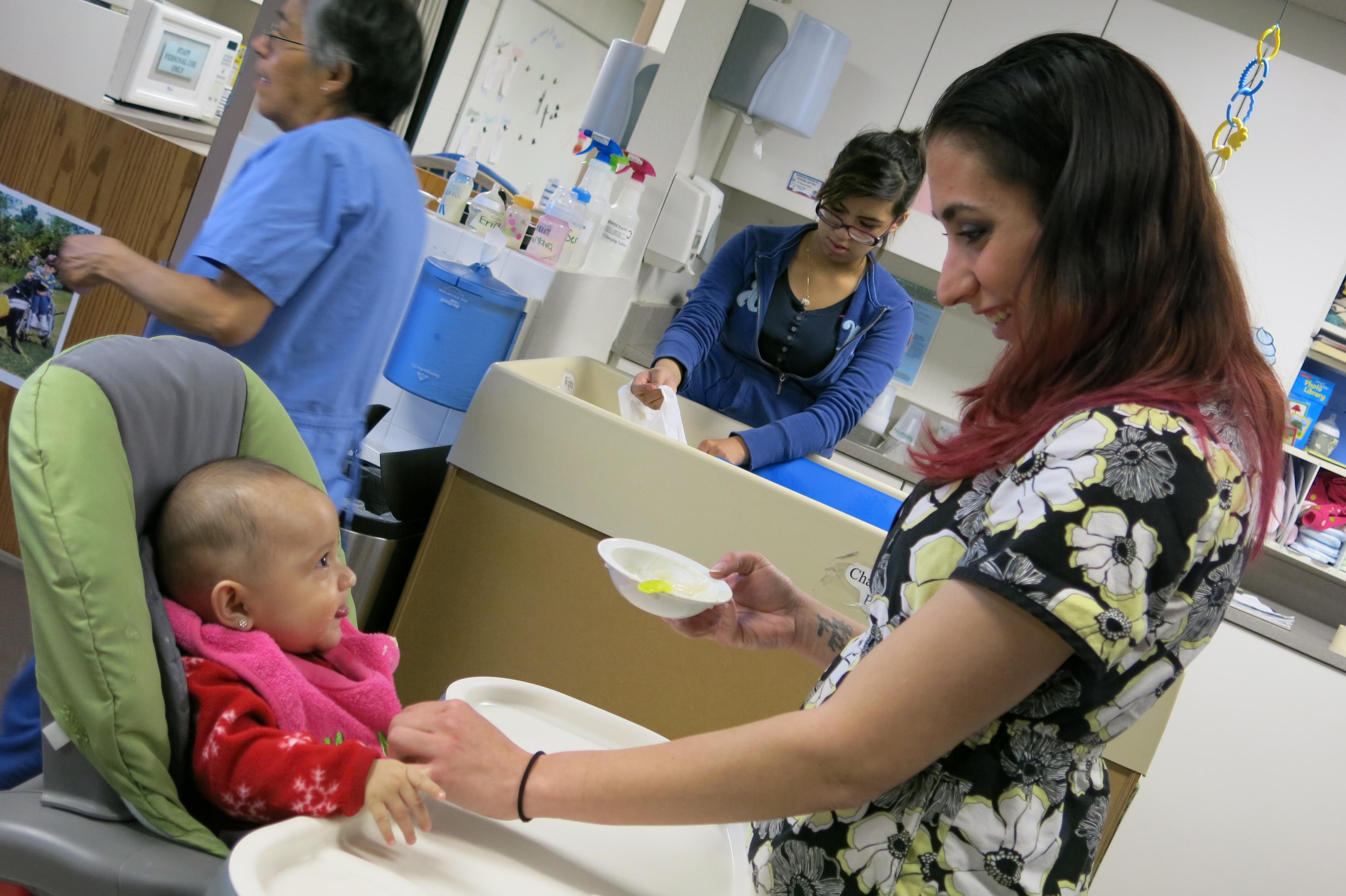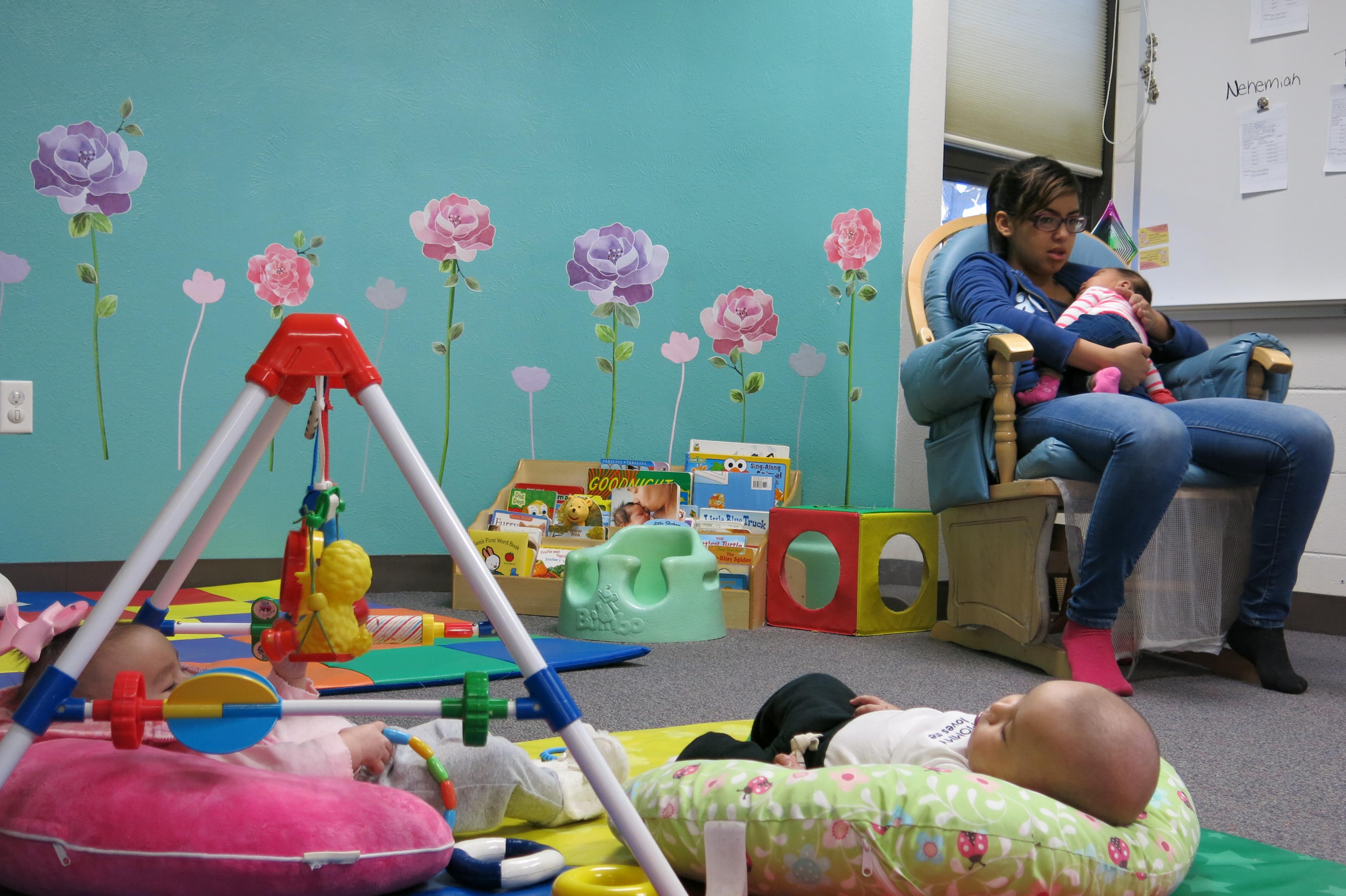
Krista Hernandez is only four months into her new life as a mother, and so far it’s been a pretty tough road.
The high school senior gave birth a month and a half early and her son Ezra then spent the next four weeks in the hospital.
"That was a really hard time for me," Krista says. "I had to go home without my baby and not get to enjoy the first things you do when you have your baby with you."
Krista is petite and soft-spoken. Cuddling her son on her lap as she sits in her social worker’s office at Denver’s West Campus, she looks calm and responsible. It’s hard to picture the "wild child" she says she was before getting pregnant.
"I liked to do things on the dangerous side," she remembers. But that was before Ezra put her life in perspective.
"I have to go to school," she says. "I have to get a job. No excuses, no nothing. I have to."
The statistics on teen mothers nationally suggest her resolve will be sorely tested. Nationally, only about half of them manage to complete high school by their early 20s.

Krista hasn’t come back to school since giving birth. She doesn’t have any child care and isn’t sure she’d be willing to leave her baby even if she did. She’s hoping to enroll in online classes to finish up the final two credits she needs to graduate, but will have to borrow a laptop and set up Internet services in order to do that. Krista admits she worries a lot about graduating.
"Being a mom is more important than school sometimes," Krista says.
'They put on a good front'
Ask people who work with teen moms about what drives them to drop out of school and they can list a litany of barriers: exhaustion from taking care of the baby, trouble getting reliable child care, and a school system poorly set up to meet their new needs.
"Having worked with these students, you know, they put on a good front. They seem to have friends at school," says Paula Keenan, who oversees teen parent services for Denver Public Schools. "Inside they're just struggling with that loneliness and people not understanding."
Pressure to drop out may also come from unexpected areas, including a teen mother’s own parents, who may suddenly demand that she stay home with her child, or start working to contribute to the household.
"Sometimes families are like, 'they can go and get GED later in life. It's not that important right now. What's more important is that they're with their kid,'" says Veronica Martinez, a social worker at Denver’s West Campus. "It's hard changing that family dynamic."
'Slipping out the backdoor'
Colorado’s teen birth rate has dropped dramatically in recent years, down more than 40 percent since 2009. At West Campus, counselors currently work with around a dozen teen parents, down from 40 or more not too long ago.
Martinez says that lighter caseload makes it possible for her staff to visit young mothers in the hospital and provide other one-on-one services.

Despite the decline, public schools in Denver and Aurora still serve hundreds of teen parents, although it’s hard to get a handle on the exact number. Pregnancy is a health condition, so while school nurses may know who’s expecting, privacy laws make it hard to share that information with the academic administration.
Similarly, while there are national numbers on how teen mothers fare in school -- in some surveys a third of girls who dropped out said it was because they became pregnant -- specific data for Colorado is elusive.
Denver Public Schools' Paula Keenan says if schools don’t start working with a student while she’s pregnant, they stand a good chance of losing her.
"What we see when we don't identify them is they're a population who will slowly kind of slip out the back door, quietly, without reaching out for that support," Keenan says.
A complicated relationship
The conventional wisdom is that having a child as a teenager raises a girl’s likelihood of dropping out and ending up in poverty. But the reverse is also true. Teen moms frequently come from lower socio-economic backgrounds and are often struggling in school long before they become parents. One widely-cited paper argues that in the long run, teen moms don't actually fair worse economically than their siblings who wait to have children. The sad reality is they're at high risk of living in poverty whether they have a child early or not.
What that means is that programs designed to help teen mothers graduate are often working with students who face challenges far beyond parenthood.
That was the story for Perla, a Denver 10th-grader with a two-year-old daughter. She was getting into fights and in danger of being expelled well before she found out she was pregnant.
"I basically thought life was easy. That I would just quit school or get a job, work for myself and get money for myself," Perla says. "But then I had my daughter and I knew I had to go back to school to get a career."
Perla now gets up at 5 a.m. and navigates two buses and the light rail to get to Florence Crittenton Services every day, a Denver high school that helps teen moms. She dreams of becoming a crime scene investigator.
"I hate waking up, but when I come to school I'm like, ‘I'm doing good!’ I'm proud of myself I've made it so far," Perla says.
People who work with teen parents say there’s a window of opportunity, after their babies are born, when the desire to do more for their children can often get them to recommit to school.

Anne Burris, a nurse in Aurora Public School’s teen parents program, says she’s seen plenty of young people recommit to their educations after having a child, and she points to research in which nearly a third of the girls studied actually did better in school after becoming mothers.
"I think there are a lot of assumptions that it's just going to blow up for all of these kids, and that's not the case," Burris says. "I would say the vast majority of young parents, are very motivated to do right by their child… and that creates an internal drive that's very, very powerful."
Helping students act on that drive requires a lot of commitment from their school, she adds.
Federal law, little oversight
Ask how Colorado’s 179 school districts handle the needs of pregnant and parenting students and you’re likely to hear nearly 179 answers.
A federal law known as Title IX requires districts do whatever it takes to help teen parents get an education, but there’s no real statewide oversight to know if schools are complying with that mandate. A teen who feels she’s being discriminated against would have to file a civil rights complaint, a high bar for young women who are already likely to be disenchanted with school.
"I think the level of support students get is so dependent on personnel who are in each building. And that's what's challenging," says Jennifer Douglas, founder of a new charter school for teen parents in Aurora. "There is law, there is policy, but in reality so much is dependent on who those people are how willing they are to accommodate the needs of a pregnant or parenting student."
Douglas was inspired to start New Legacy high school after learning about the scope of the problem in northwestern Aurora and neighboring parts of Denver. The four zip codes surrounding her facility average more than 150 teen births a year.

When New Legacy opens this fall, it will be the third Colorado school focused entirely on teen parents. A charter school in Montrose serves girls on the Western Slope. And in Denver, the grandmother of them all is the 130-year-old Florence Crittenton Services.
Walking the halls of Flo Crit, as it’s known, is a lesson in what it takes to help teen mothers succeed. There’s a high-quality, on-site early learning center where students can leave their children and a family resource center that strives to get the older generation invested in the girls’ success. In order to combat the pressure students might feel to get a job, the organization rewards girls for their good attendance and academic improvement with baby supplies and gift cards.
The approach is demonstrating success; Flo Crit regularly graduates about 80 percent of its students. Director Suzanne Banning points out that that diploma doesn’t just give girls access to higher education and better paying jobs. Research suggests it will impact the course of their children’s life, too.
"The probability of their child graduating from high school because they did goes up exponentially," Banning says. "And that's what we're here to do, to create a cycle of success to break the cycle of poverty. And you can only do it by investing more than you do at a traditional high school."
That focus on the future is evident in Flo Crit's students too. Tenth grader Perla says she's already talking to her young daughter about what she wants for her.
"I tell her all the time, 'I can't wait to see you grow up and go a different path than I did,'" Perla says. "Skip being a teen mom, skip fighting, skip expulsion. Skip all that and and graduate on time and do everything she can to become somebody in life, faster than her mom. I tell her that all the time and she just looks at me like, 'yeah, mom, yeah.' "
This story is part of our ongoing exploration of Colorado kids who are living in poverty, how it affects their lives and our common future. We'd like to hear your ideas about about what can be done about child poverty in Colorado. Share your thoughts through our Public Insight Network.









